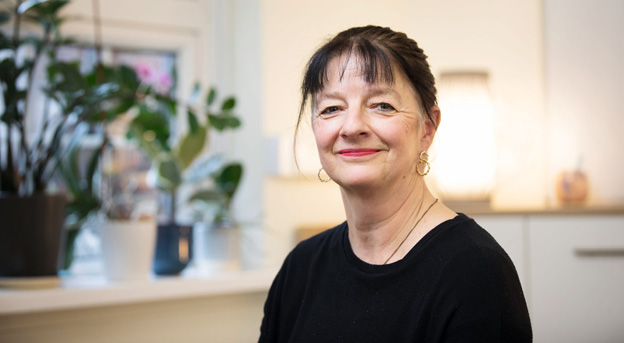Cancer can stir up feelings that are difficult to process, so our highly skilled team of mental health professionals offers patients much-needed psychological support.

For many patients, a cancer diagnosis and treatment can have a huge impact psychologically as well as physically. As Sonali Seddon, Oncology Psychotherapist in The Royal Marsden’s Adult Psychological Support Service, says: “It’s not only your body going through the treatment – it’s your whole self.”
Supported by The Royal Marsden Cancer Charity, our psychological support service accepts referrals for patients who have had treatment within the past two years. It’s often soon after treatment irrespective of how it may have gone – when challenging emotions surface.
“Throughout treatment, they’ve been focusing on getting through it,” explains Sonali. “But after it’s finished, there’s a sense of, ‘Gosh, what have I been through? How do I live my life after this?’ It’s a huge shock.”
There’s also an expectation that, post-treatment, life should have returned to normal. “People think, ‘[I] should be happy, [my] treatment was successful,’” she says. “But there’s still a big recovery that needs to happen psychologically. They’re still grieving something and still living with huge uncertainty.
Patients often talk about how lonely it is to be a cancer patient because no one really gets it.”
To begin the journey to psychological recovery, Sonali and the team work on building a therapeutic relationship with their patients. “It’s about having a space that has a boundary, but is outside their everyday life,” she says.
In this safe and impartial space, the patient feels able to tell their story and begin to understand what they’ve experienced. “There’s huge power in having someone who’s non-judgemental providing a therapeutic space,” says Sonali. “Patients can say something that is really hard to voice otherwise. It can be part of the reparative experience.”
Art works
One of the services the team offers is art therapy. “Patients don’t have to be good at art,” explains Alison Templeman-Wright, Senior Art Psychotherapist. “It’s about exploring the materials.
“The art acts as a bridge to communication – for some, it can be really helpful. If they can see something they’ve made, then through our conversation I can point things out and they suddenly realise what’s been staring them in the face.”
Art therapy works on many different levels. For some patients, simply using the material itself can be very relaxing, making them feel more comfortable to talk about their difficulties. For others, the therapy is a useful tool for accessing something deeper.
“The actual sensory act of making the artwork can tap into feelings and memories they’ve perhaps dampened or not understood,” says Alison. “But through the sessions, they can start to understand why they’re feeling this way.”
Sex after cancer
Sexual wellbeing is commonly affected by cancer, so psychosexual therapy is a key element of patient support.
“Any cancer diagnosis can affect how we feel about being a sexual person, as well as the general mechanics of sex,” says Caroline Lovett, Senior Psychosexual and Relationship Therapist (pictured below). “When patients first get their diagnosis, it’s not usually what they think about – they’re just coping with the diagnosis and treatment. But often afterwards, they question: ‘Who am I sexually now, and is anything going to feel different?’”
Caroline sees people from all stages of life (“My youngest patient is 16 and my oldest is well into their 80s”) and, as well as offering reassurance that what they’re going through is normal, she helps them find practical solutions. For example, she has worked with teenagers who have gone through an early menopause as a result of their treatment.

One of Caroline’s biggest challenges is helping patients overcome their embarrassment. “Often, on the first session, they can be a bit nervous,” she says. “Humour can be useful in breaking down those barriers. After the first few sessions, they start to trust me and open up.
“It’s really important that we give people an opportunity to talk about how they are sexually because our sexuality is a huge part of our happiness and how we feel about ourselves. I can be talking to people in their 70s or 80s and they tell me that this is the first time in their life they’ve really been able to talk honestly about that sexual side of themselves.”
Psychological support after a cancer diagnosis is a crucial aspect of patients’ recovery and The Royal Marsden excels in recognising this, says Sonali.
“We’re a fantastic team and it’s such a privilege to work with patients and be alongside them on their journey. We’re experts at what we do, and we’re experts in cancer.”
Want to know more?
Contact the Adult Psychological Support Service at Chelsea on 020 7808 2777 or Sutton on 020 8661 3006
 KEYFACT Energy
KEYFACT Energy